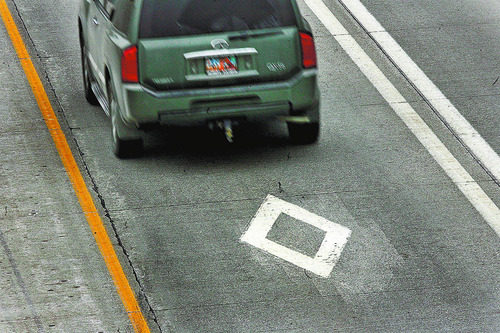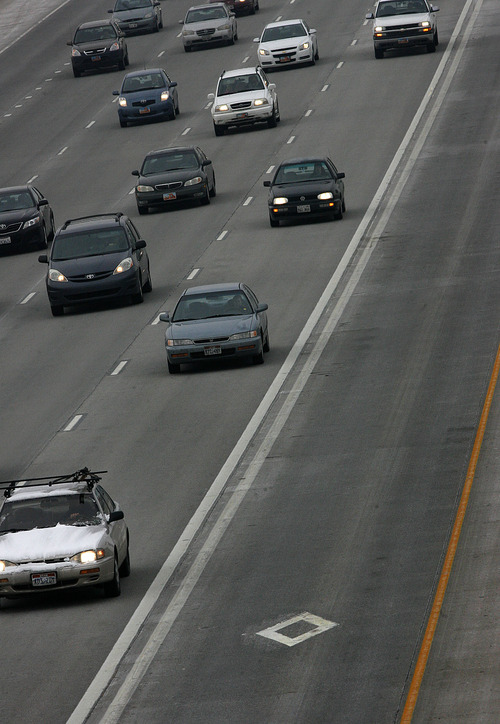This is an archived article that was published on sltrib.com in 2014, and information in the article may be outdated. It is provided only for personal research purposes and may not be reprinted.
Bountiful • Utah Transportation Commission members almost always act unanimously. But they had a rare split Friday on whether to charge a monthly $2.85 fee to motorists who don't often use toll transponders they bought to use freeway express lanes when driving solo.
Commissioners finally decided to ask Utahns what they think about the fee — including sending emails to all transponder owners — and then vote in November.
The Utah Department of Transportation is proposing the fee because the contractor that collects electronic tolls charges the state $2.85 a month per account for the service.
UDOT says 45 percent of the 14,000 account owners either do not use transponders or use them rarely. So it says state payment of $2.85 a month for such accounts wastes $18,800 a month, or about $225,000 a year.
UDOT seeks to make anyone who doesn't spend at least $2.85 a month in tolls to pay that much in an administrative fee instead — effective next July 1. It said most states with toll roads charge similar fees.
But a divided commission was not ready Friday to approve the change.
Commissioner Gayle McKeachnie, a former Utah lieutenant governor, questioned whether UDOT really needs the money or seeks it "just because it's sitting there and you can put it in your pocket." He suggested UDOT seek a better deal from the contractor instead.
"I speak for the taxpayer and the customer. Government has enough money," McKeachnie said.
He added that the fee may hurt people who live far from the Wasatch Front and its express lanes who may not use transponders much but keep them for use during occasional trips there. McKeachnie lives in Vernal.
But Commissioner Wayne Barlow questioned whether taxpayers in general — and frequent transponder users who now are paying their way — should subsidize the transponder owners who rarely use them.
"Let's cover this overhead so it doesn't come out of the budget otherwise," Barlow said — and urged a quick vote to approve it, saying it is a small issue and small cost.
"It is a small thing," agreed Commissioner Dannie McConkie. "But let's be sensitive to the people we serve and give them an opportunity to weigh in on it."
The commission followed his recommendation to delay a vote for a month, and directed UDOT to email transponder owners at addresses on file to see what they think.
McConkie also suggested that UDOT annually email people who do not use accounts much, and urge them to them to cancel the service.
UDOT Operations Manager Jason Davis said the toll-system fund is breaking even financially now, but the system is new and maintenance costs low. Those are expected to increase as the system ages — so Davis said it would be wise to cut overhead costs.
Rob Clayton, UDOT director of traffic management, said 252 transponder owners "actually have never used them, not once."
Why? "Maybe it's the Utah nature of being prepared," Davis said. "They are prepared for the eventuality of driving in the toll lane, but they never have really needed to do it."
Clayton said another 2,216 transponder users have not used them in 2014. Transponders cost $8.75, and UDOT requires minimum deposit of $25 to open an account.
Davis added if UTA started charging the $2.85 monthly fee, many of those non-users finally "would say I don't need it, so I'm going to turn it off."
Clayton said the express lanes — which are free to vehicles carrying at least two people and motorcycles — now stretch 62 miles along I-15 on the Wasatch Front, and will soon be 72 miles when additions in Davis County are completed. He said these make up the longest continuous stretch of high-occupancy vehicle lanes in America.
The express lanes carry 54 percent more people than regular lanes, because of their use by carpools and because of higher average speeds that allow them to carry more cars. UDOT estimates that the resulting reduced congestion in all lanes saves Utahns $15 million a year in time and fuel.





